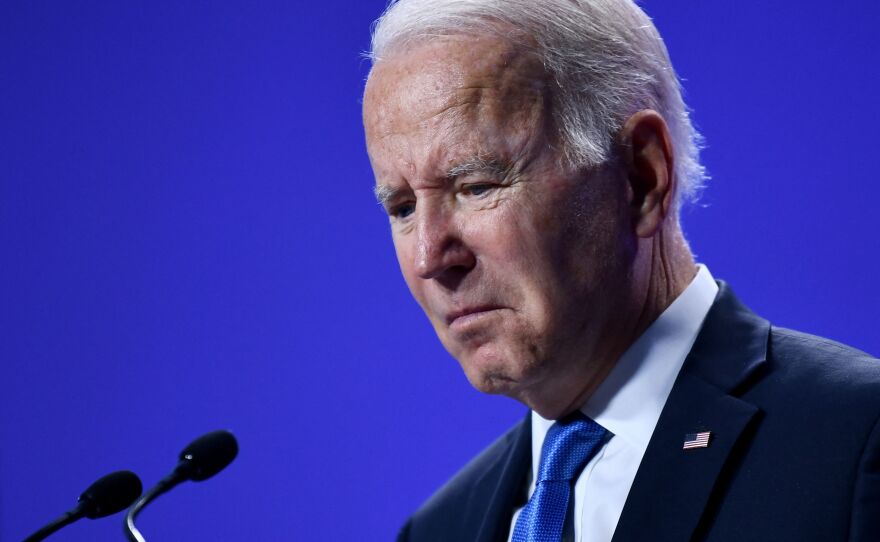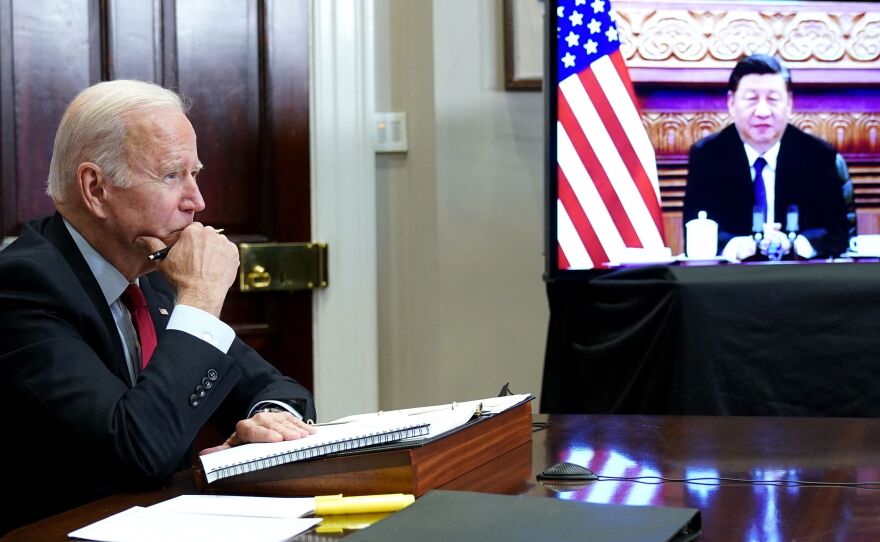A recent surge in gasoline prices has left President Biden scrambling for options to do something about it.
One that's getting a lot of attention is the possibility that the Biden administration will release crude oil from the country's emergency oil stockpile, known as the Strategic Petroleum Reserve.
Much will depend on oil prices, which have soared over the past year, recovering to their pre-pandemic levels and then some. But after rising to more than $86 a barrel in October, they have since dropped to less than $80.
A lot of factors are affecting prices — including the fact that the White House is now talking about tapping the stockpile.
Here's an explainer on the country's oil reserves and whether tapping them would actually be effective.
What is the Strategic Petroleum Reserve, or SPR?
It's a stockpile of crude oil that the U.S. maintains in case of emergency. If supplies are disrupted, such as by a hurricane or a war, the U.S. can tap the reserves and avoid catastrophic shortages.
The SPR was established after the oil crisis of the 1970s. The oil is stored in underground salt caverns in Texas and Louisiana. The caverns currently hold more than 600 million barrels of oil. That's slightly less than one month's worth of oil at current U.S. consumption levels.
In addition to being tapped for emergencies, the oil in the reserve can also be loaned out to oil companies (which repay it with interest), or sold off to raise money for the federal government.
Congress has already ordered the release of tens of millions of barrels over the next few years for nonemergency reasons.

Why is Biden considering tapping the SPR now?
The emergency oil reserve is not hypothetically intended to be tapped as a way to manage prices; it's supposed to manage major supply disruptions, which the market is not currently experiencing. But it is one of the few tools the president has to push oil prices down.
In October, U.S. crude prices rose to seven-year highs. It was a very rapid increase from earlier in the pandemic, when prices even briefly turned negative, meaning oil traders were actually paying others to take barrels off their hands.
And rising energy prices, including natural gas and coal as well as oil, are a major contributor to high inflation.
OPEC has declined to boost production to address high prices, despite White House appeals. The oil cartel led by Saudi Arabia has stuck with its policy of gradual increases in production as the global economy continues to recover from the pandemic.
U.S. oil producers — under pressure from their own investors — have also not increased production by as much as they typically do when prices are this high.
That has left the Biden White House under intense pressure to do something to address high prices. After all, history has shown that surging gas and food prices can take a heavy political toll.
How much impact would an SPR release actually have?
Just the possibility of a release from the SPR has already helped drive prices down. An actual announcement would be expected to push prices down more ... but only temporarily.
That's because a one-time release doesn't really shift the underlying supply and demand dynamics that drive oil prices.
"The impact would likely be mild and short-lived, according to past historical examples of sales," Louise Dickson, senior oil markets analyst at Rystad Energy, said in a note this week.
The size of the effect on markets would also depend on how large the release is.
What if multiple countries tapped their reserves?
Coordinating a release with other countries could give an SPR release more punch. The White House has been asking other major oil consumers, who have their own petroleum reserves, to release oil from their stockpiles in a single coordinated action.

China is reportedly considering a release from its own SPR, although it's not clear whether it's a response to the appeal from Biden. Some other countries have indicated they believe their reserves should be saved for potential supply shocks, not used to move prices.
"Other countries don't necessarily look at strategic reserves the same way the U.S. does," says Kevin Book, managing director of Clearview Energy Partners. "We're the only country in the world that is liquidating its security blanket. ... We're burning it for money."
But even a coordinated release might only have a temporary impact. In June 2011, the announcement of an SPR release coordinated through the International Energy Agency to respond to a crisis in Libya pushed prices down 6%. But two weeks later, prices were right back where they had been.
What's the outlook for oil prices?
Recent projections from the Energy Information Agency, the International Energy Agency and OPEC all predict that oil supply will increase by early next year and that the world will wind up with an oil surplus. That would push prices down.
But some analysts are more skeptical and predict that prices will remain high well into 2022.
Copyright 2021 NPR. To see more, visit https://www.npr.org. 9(MDAzMjM2NDYzMDEyMzc1Njk5NjAxNzY3OQ001))







